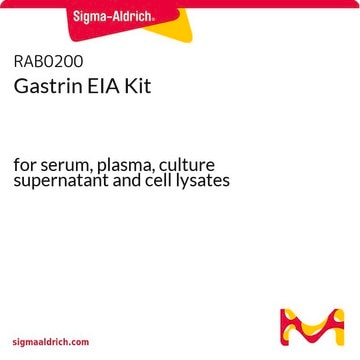All Photos(1)
About This Item
Empirical Formula (Hill Notation):
C74H99N15O26S1
Molecular Weight:
1646.73
UNSPSC Code:
51111800
NACRES:
NA.32
Recommended Products
Assay
≥95% (HPLC)
form
lyophilized
composition
Peptide Content, ≥75%
storage condition
protect from light
storage temp.
−20°C
Amino Acid Sequence
Leu-Glu-Glu-Glu-Glu-Glu-Ala-Tyr-Gly-Trp-Met-Asp-Phe-NH2
Application
Gastrin is a linear polypeptide that induces the secretion of gastric acid (HCl) by parietal cells. Gastrin is found in three major forms: gastrin-34 (big gastrin); gastrin-17 (little gastrin) and gastrin-13 minigastrin.
Storage Class Code
11 - Combustible Solids
WGK
WGK 3
Flash Point(F)
Not applicable
Flash Point(C)
Not applicable
Certificates of Analysis (COA)
Search for Certificates of Analysis (COA) by entering the products Lot/Batch Number. Lot and Batch Numbers can be found on a product’s label following the words ‘Lot’ or ‘Batch’.
Already Own This Product?
Find documentation for the products that you have recently purchased in the Document Library.
Incretin physiology beyond glucagon-like peptide 1 and glucose-dependent insulinotropic polypeptide: cholecystokinin and gastrin peptides.
Rehfeld JF.
Current Opinion in Gastroenterology, 201, 405-411 (2011)
Suzana Kovac et al.
Biochimica et biophysica acta, 1813(5), 889-895 (2011-02-16)
The peptide hormone gastrin has been identified as a major regulator of acid secretion and a potent mitogen for normal and malignant gastrointestinal cells. The importance of gastric acid in the absorption of dietary iron first became evident 50 years
Gastrin in gastrointestinal diseases.
Daniel Fourmy et al.
Gastroenterology, 141(3), 814-818 (2011-07-20)
Sara Calatayud et al.
Mini reviews in medicinal chemistry, 10(1), 8-19 (2010-04-13)
Gastrin release is affected by gastric inflammatory conditions. Antral G cells respond to inflammatory mediators by increasing gastrin secretion. Accumulating experimental evidence suggests that gastrin exerts immunomodulatory and proinflammatory effects. Gastrin could be a contributing factor to these pathologies, which
Mitchell L Schubert
Current opinion in gastroenterology, 27(6), 536-542 (2011-09-08)
The review summarizes the past year's literature regarding the regulation of gastric exocrine and endocrine secretion, both basic science and clinical. Gastric acid secretion is an elaborate and dynamic process that is regulated by neural (efferent and afferent), hormonal (e.g.
Our team of scientists has experience in all areas of research including Life Science, Material Science, Chemical Synthesis, Chromatography, Analytical and many others.
Contact Technical Service





![[Leu15]-Gastrin I human ≥95% (HPLC)](/deepweb/assets/sigmaaldrich/product/structures/153/342/d4cb3dd7-13f1-46cf-8d1f-3907a5de7a83/640/d4cb3dd7-13f1-46cf-8d1f-3907a5de7a83.png)


